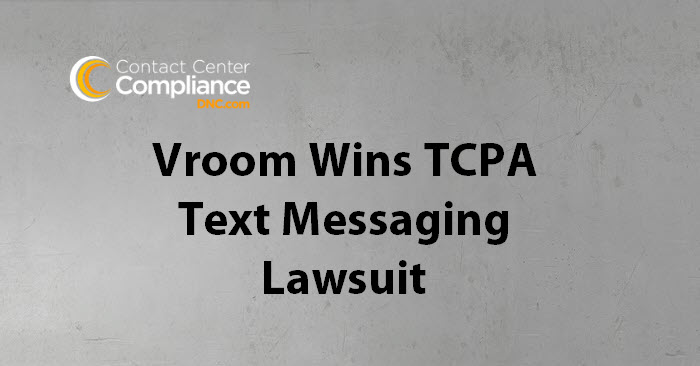Vroom, Inc., an online car retailer, received a favorable ruling from the Southern District of Florida in March that is good news for business that use automated text messaging. The question before the court was whether a single automated text message inquiring about the purchase of a car violated the TCPA. The lawsuit dealt with the issue of consent and the type of consent required as defined by the TCPA.
The Case Facts
On July 12, 2016, the plaintiff, Mark Edelsberg, posted a classified advertisement on Craigslist for the sale of a 2010 Toyota Prius. The advertisement stated:
“Toyota Prius 2010 — $9750 (Miami) 2010 Silver Toyota Prius 71,000 miles. One owner,
well kept, good clean car. Call XXX-XXX-64452 for more info do NOT contact me with
unsolicited services or offers.“
A few days later, Vroom’s system found Mr. Edelsberg’s advertisement. On July 14, Vroom sent Mr. Edelsberg the following single automated text message response to the cellphone number listed in the advertisement:
“Hi Mark, I am Scott at Vroom. I saw you listed your Prius online & can make an offer
but need you to fill out a few more details (takes 4 min) http://go.vroom.com/syc/XXXXXX.
Text STOP to Quit”
Mr. Edelsberg did not click on the link in the text message. Had he done so, he would have been directed to Vroom’s vehicle appraisal form. Once completed, Vroom would have sent him a cash offer voucher for the purchase of his Prius.
The Lawsuit
On November 18, 2016, Mr. Edelsberg filed his lawsuit against Vroom. He claimed that Vroom’s text message constituted telemarketing or alternatively, a “dual purpose” message that contained a telemarketing element. For Vroom this meant that under the Telephone Consumer Protection Act (TCPA) they would have been required to have obtained “prior expressed written consent” before initiating the communication with Mr. Edelsberg.
Under TCPA text messages sent to cellphones are treated as phone calls. The Federal Communication Commission (FCC) requires prior expressed “written” consent for autodialed or prerecorded telemarketing calls to wireless numbers and residential lines.
The Court Ruling
For the purposes of the TCPA, telemarketing is defined as “the initiation of a telephone call or message for the purpose of encouraging the purchase or rental of, or investment in, property, goods, or services, which is transmitted to any person.”
It determining its ruling, Judge Darrin Gayles had to consider:
- Does Vroom’s text message constitute a telemarketing message?
- What is the required level of consent “prior express consent” or “prior express written consent”?
The first issue addressed was deciding the nature of the text message. The court considered whether Vroom’s text message could be considered telemarketing. The answer would allow the court to determine the level of consent required. If the court ruling favored the call as telemarketing then Mr Edelsberg would need to have provided Vroom with “prior express written consent” for Vroom to avoid a TCPA violation. If not then only “prior express consent” would have been required before contacting him.
“Communications that merely include collateral opportunities to purchase something from the caller do not constitute dual purpose messages where the opportunity to purchase something from the caller is too attenuated from the purpose of the initial communication.” – Judge Gayles
The court concluded that Vroom’s text message requesting more details was not a “telemarketing” message because it didn’t offer to sell anything to Mr. Edelsberg. A plain reading of the text did not reveal an advertising purpose in that Vroom was only requesting additional information about the car being sold.
“The fact that Vroom ultimately seeks to resell the used cars it has purchased cannot transform every communication it makes in response to a classified advertisement into telemarketing.” – Judge Gayles
This was an important victory for Vroom. The decision that the text was not telemarketing meant that Vroom was only required to show that Mr. Edelsberg provided “prior express consent” to be contacted. On that issue the court again sided with Vroom.
The court held that Mr. Edelsberg’s advertisement provided sufficient consent to receive text messages related to the sale of his vehicle because he knowingly published his cellphone number with explicit instructions to contact him for more information. Vroom’s text message simply expressed an interest in purchasing the vehicle, but needed additional information before making an offer.
Conclusion
This is an important victory for businesses that use automated text messages to make offers for goods. Had the decision gone against Vroom, it would have resulted in a dramatic marketing change for business that text messages to make purchases online. The issue of consent was pivotal to the ruling in this case and equally important every day to businesses concerned about complying with the consent requirements under TCPA.
